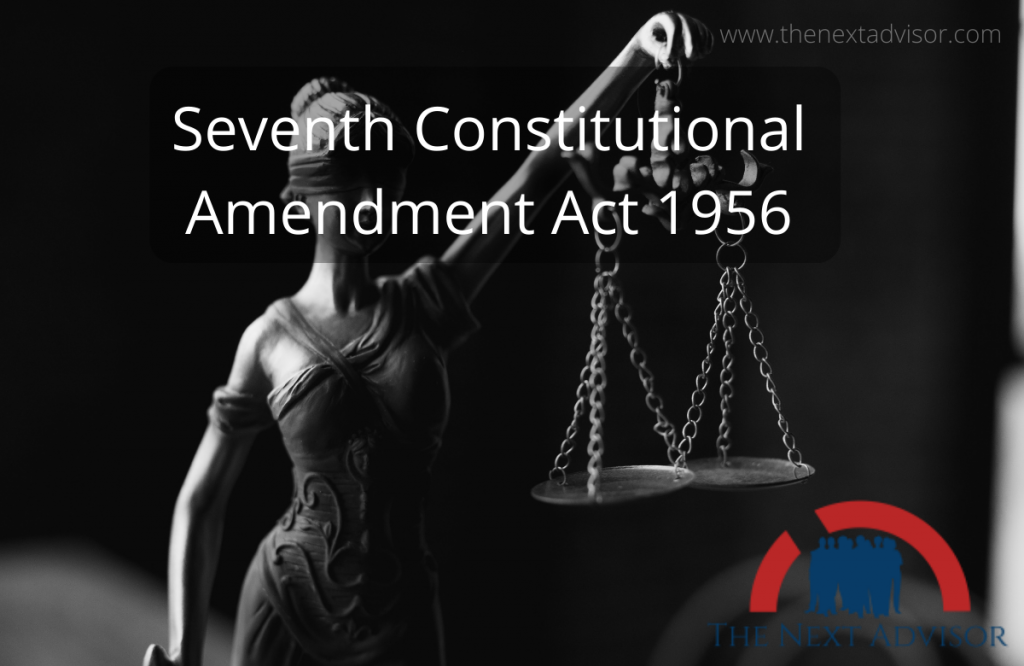Seventh Constitutional Amendment Act 1956
Hello friends, I would like to put your attention to my next topic, i.e. Seventh Constitutional Amendment Act 1956. You all know about this but I will explain Seventh Constitutional Amendment Act 1956 in detail.
You would know that in India from 1952 demand was increasing for the state reorganization. The people of the state were demanding the new state on a linguistic basis, like Andhra Pradesh. Andhra Pradesh was made on the linguistic pattern. So to make this state reorganization Seventh constitutional amendment was made. And changes were made in the 4th schedule by which states can be merged properly and new states can be made. Let us see what was done in the seventh constitutional amendment.
What was done?
-
to implement the scheme of States reorganization
-
to appoint a Governor for two or more States
-
to alter the maximum to one-third of the strength of the Legislative Assembly.
-
It is proposed to fill the lacuna with a new article 258A.
-
It is proposed to replace article 371 with another article making a special provision with respect to the States of Andhra and Punjab
-
State Reorganisation Act was passed by the Parliament in November 1956. It provided for 14 states and 6 centrally administered territories.
-
A strong reaction came from Maharashtra where widespread rioting broke out and eighty people were killed.
-
June 1956, under pressure Bombay state, was divided into Maharashtra and Gujarat with Bombay city forming a separate, centrally administered state. But opposed by Maharashtra.
-
Bilingual Bombay proposed, again opposed. The government finally agreed in May 1960 to bifurcate the state of Bombay into Maharashtra and Gujarat, with Bombay city being included in Maharashtra and Ahmedabad being the capital of Gujarat.
-
Punjab 1956, the state of PEPSU had been merged with Punjab, which however remained a trilingual state having three language speakers – Punjabi, Hindi, and Pahari within its borders.
7th Amendment
The territorial changes and the formation of new states and Union territories as proposed in Part Il of the States Reorganisation Bill, 1956, involve a complete revision of the Fourth Schedule to the Constitution by which the seats in the Council of States are allocated to the existing States.
The present allocation is made on the basis of the population of each State as ascertained at the census of 1941 and the number of seats allotted to each Part A and Part B State is according to the formula, one seat per million for the first five million and one seats for every additional two million or part thereof exceeding one million
Article 153 is also amended by this amendment. In the original constitution in Article 13, the government can not appoint one governor for more than one state. So by this amendment governor can be appointed for two or more states also. to appoint a Governor for two or more States.
Article 171 is also amended by the seventh constitutional amendment
- Bicameralism is not a compulsory mechanism. As you know if the state wants to have a council, so the state can keep the legislative council, and if the state does not want to have the council so the state can remove the legislative council. But due to this provision, there is no mention in this act that what is the upper cap of the legislative seats. Prior to this amendment upper limit of the legislative seats is one-fourth.
- the maximum strength of the Legislative Council of a State is fixed at one-fourth of the strength of the Legislative Assembly of that State. Although in the larger States, like Uttar Pradesh and Bihar, this maximum is adequate, it leads to difficulties in the case of the smaller States.
- It is, therefore, proposed to alter the maximum to one-third of the strength of the Legislative Assembly.
- While the President is empowered by Article 258 (1) to entrust Union functions to a State Government or its officers, there is no corresponding provision enabling the Governor of a State to entrust State functions to the Central Government or its officers.
- This lacuna has been found to be of practical consequence in connection with the execution of certain development projects in the States. It is proposed to fill the lacuna with a new article 258A.
Article 258A
Notwithstanding anything in this Constitution, the Governor of a State may, with the consent of the Government of India, entrust either conditionally or unconditionally to that Government or to its officers’ functions in relation to any matter to which the executive power of the State extends.
